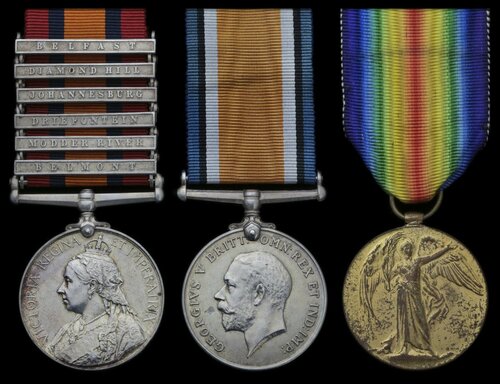
Auction: 21003 - Orders, Decorations and Medals
Lot: 191
(x) Three: Private W. Bond, Northumberland Fusiliers, late Coldstream Guards, who served throughout the Boer War and re-joined to serve in the Great War only to be severely wounded on the First Day of the Battle of the Somme, 1 July 1916
Queen's South Africa 1899-1902, 6 clasps, Belmont, Modder River, Driefontein, Johannesburg, Diamond Hill, Belfast (1332 Pte W. Bond, Cldstm: Gds:); British War and Victory Medals (20-25 Pte. W. Bond. North'd Fus.), suspension slack on first, somewhat worn overall, nearly very fine (3)
William Bond was born on 25 September 1878 at Choppington, Morpeth the son of Thomas Bond, a coal miner. Following in his father's footsteps Bond became a coal miner but that life must not have agreed with him because on 8 January 1898 he enlisted for the Coldstream Guards whilst in London. Posted first to Gibraltar (10 March 1899) he joined the Regiment in sailing first for Malta then the the Cape, arriving on 28 October 1899. The 1st Battalion Coldstream Guards served with the Guards Brigade under Major-General Colville; this formation was allocated for the relief of Kimberley and took part in the advance towards the Modder River. Engaged at Belmont on 23 November the Battalion was in reserve on the extreme right and behind the British line opposite Gun Hill. During the second phase of the offensive the 1st and 2nd Battalions Coldstream Guards were brought forward to assault Razor Back and Sugar Loaf kopjes. The left wing of the 1st Battalion also became involved in a frontal attack on the Mont Blanc feature in the centre of the Boer line. At Modder River they were on the right of the British line and came tantalisingly close to uncovering the main ford but were called back by Major-General Colville before this could happen. The 1st Battalion was in on the victory however, with a party of them comprising some of the reinforcements who crossed the river to join the King's Own Yorkshire Light Infantry. Engaged again at Magersfontein, were Methuen's advance was finally checked, the Guards Brigade again took up a position on the right of the line.
Not long after the defeat at Magersfontein, Bond was arrested for failing to obey orders whilst on active service. Standing trial he was found guilty and imprisoned on 31 May 1900. Released on 26 July 1900 he continued to serve with his Regiment for the duration of the war. After the arrival of reinforcements the 1st Battalion joined the advance towards the two Boer Republics, fighting at Driefontein, Diamond Hill and Belfast before going on to act as garrison troops in Cape Colony during the Guerrilla phase of the war. Bond left South Africa on 5 October 1902 and returned home, where he continued to serve until 8 January 1905 before being transferred to the Army Reserve. Discharged from the Reserve on 7 January 1910, he rejoined the army on 26 October 1914 and during the Great War served with the 20th Battalion (1st Tyneside Scottish), Northumberland Fusiliers. Deployed with this unit on the First Day of the Somme (when they were posted at La Boisselle) Bond was wounded in action and posted to the Regimental Depot. Unfortunately his injuries where too severe and precluded him from further active service; he was discharged on 18 April 1917. He died on 27 September 1951 at Wingrove, Newcastle; sold together with census data, service records and extracts relating to the Coldstream Guards during the Boer War. Further entitled to a King's South Africa Medal and a Silver War Badge.
Subject to 5% tax on Hammer Price in addition to 20% VAT on Buyer’s Premium.
Sold for
£420
Starting price
£240




